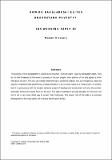| dc.contributor.author | Hossain, Naomi | |
| dc.coverage.spatial | Bangladesh | en_GB |
| dc.date.accessioned | 2014-01-24T10:51:24Z | |
| dc.date.available | 2014-01-24T10:51:24Z | |
| dc.date.issued | 1999 | |
| dc.identifier.citation | Hossain, N. (1999) How do Bangladesh Elites Understand Poverty? IDS Working Paper 83, Brighton: IDS. | en_GB |
| dc.identifier.uri | https://opendocs.ids.ac.uk/opendocs/handle/20.500.12413/3401 | |
| dc.description.abstract | The poverty of most Bangladeshis is viewed as an important - but not urgent - issue by Bangladesh's
elites. They
do not feel threatened by the extent of poverty, or by poor people. Some sections of the elite appear to know
little about the poor. The poor are instead viewed through a somewhat idealistic lens, as homogenous, deserving
objects of traditional elite philanthropy. Poverty alleviation is at one level viewed as a moral project. At another
level it is synonymous with the broader, technical project of development: development will solve the problem
eventually, without any special focus on the poor. The state is expected to provide education for the poor, but
not to act in any more direct way to protect their livelihoods. The proper role of the state is to promote
development in the broad sense, not to ensure that the poor are fed. | en_GB |
| dc.language.iso | en | en_GB |
| dc.publisher | IDS | en_GB |
| dc.relation.ispartofseries | IDS working papers;83 | |
| dc.rights.uri | http://www.ids.ac.uk/files/dmfile/IDSOpenDocsStandardTermsOfUse.pdf | en_GB |
| dc.subject | Poverty | en_GB |
| dc.title | How do Bangladesh Elites Understand Poverty? | en_GB |
| dc.type | IDS Working Paper | en_GB |
| dc.rights.holder | Institute of Development Studies | en_GB |
| dc.identifier.koha | 114186 | |

